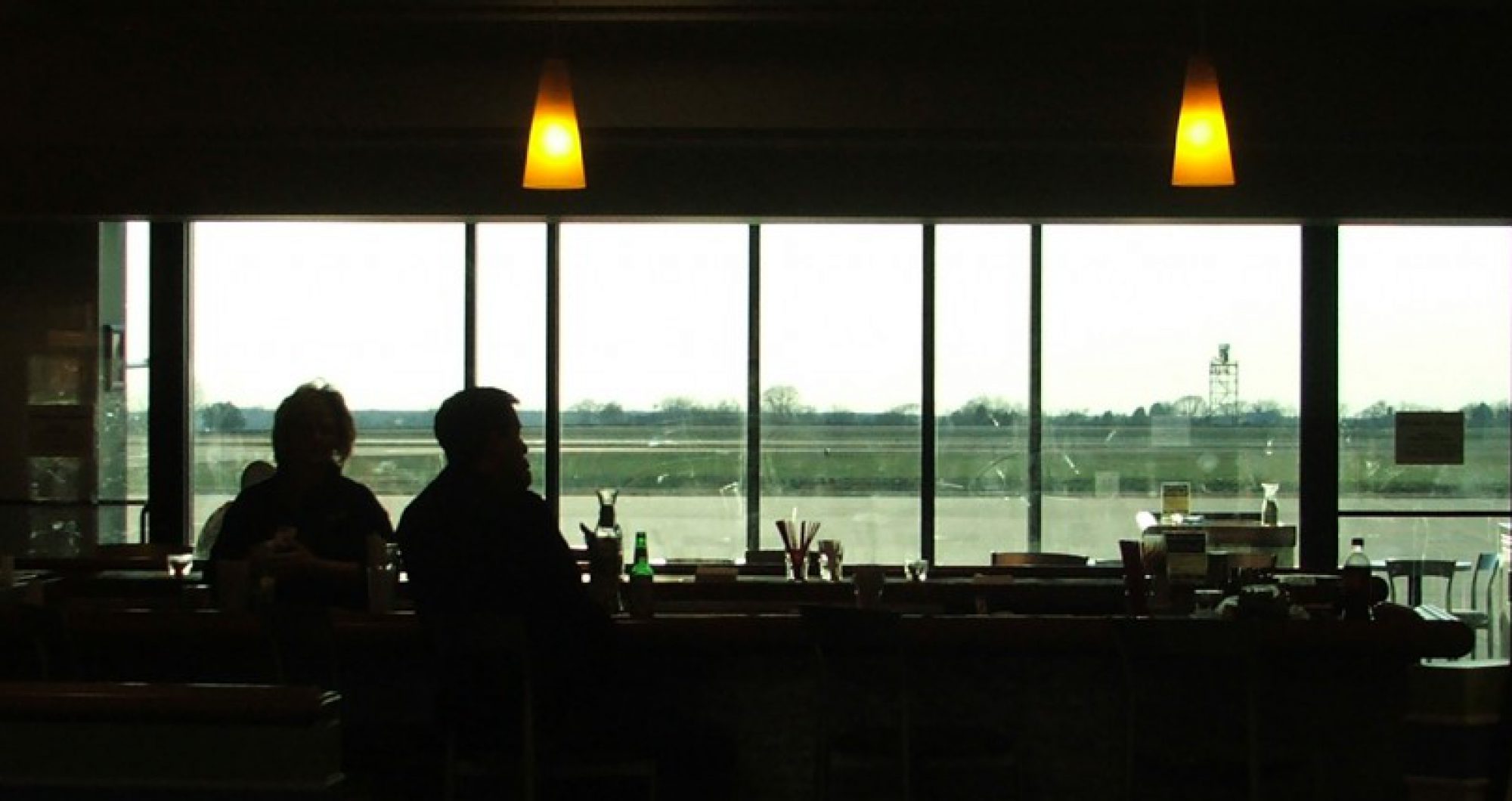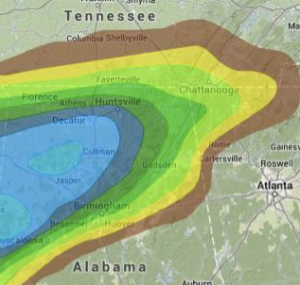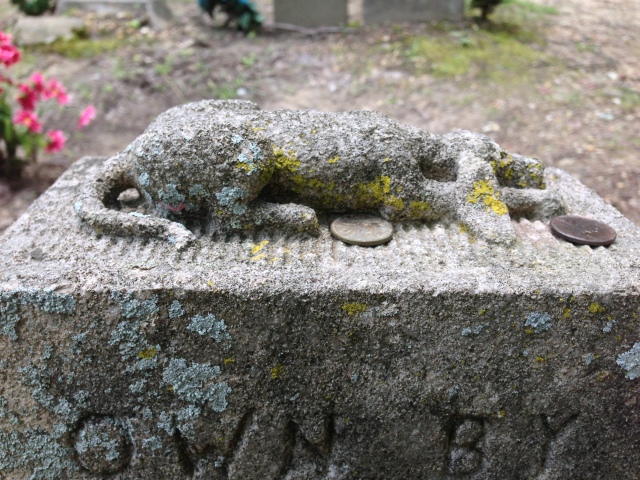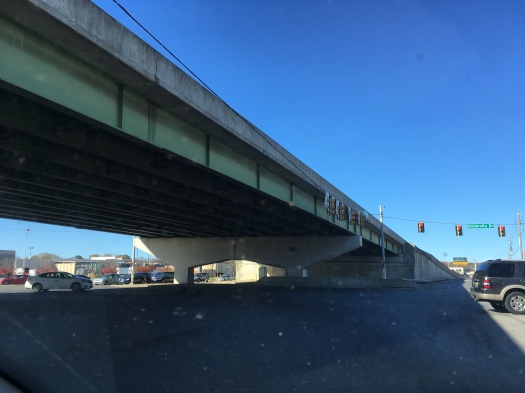 At the beginning of his hospital stay, I had a sense of urgency that things at home needed to be put right because as soon as he was out there would be no time to attend to anything. Our lives would be falling apart in the rearview mirror as we embarked on the road to recovery, maybe even in another city. I would need to leave behind a manual for all of it.
At the beginning of his hospital stay, I had a sense of urgency that things at home needed to be put right because as soon as he was out there would be no time to attend to anything. Our lives would be falling apart in the rearview mirror as we embarked on the road to recovery, maybe even in another city. I would need to leave behind a manual for all of it.
Shall we drive?
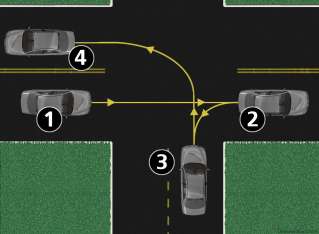 According to the state of Alabama, the Younger Daughter is now officially allowed to drive to Kale Smoothie Palace and Bendy Yogastore all by herself. And if you need anyone to go the grocery store, I’m yer man, she informs me.
According to the state of Alabama, the Younger Daughter is now officially allowed to drive to Kale Smoothie Palace and Bendy Yogastore all by herself. And if you need anyone to go the grocery store, I’m yer man, she informs me.
You’re driving. Me crazy
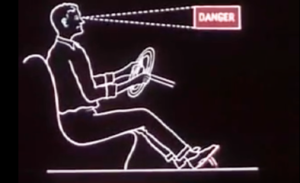 Learning to drive as a teenager in Manhattan was a hypothetical situation. Like stenography and monogrammed linens, it might be of use in the future, but was not essential for my immediate life. I looked forward to driving, sort of, but I didn’t think I would be particularly good at it. The whole left/right thing was off-putting, as was the fact that you could literally kill yourself and other people if you made a mistake.
Learning to drive as a teenager in Manhattan was a hypothetical situation. Like stenography and monogrammed linens, it might be of use in the future, but was not essential for my immediate life. I looked forward to driving, sort of, but I didn’t think I would be particularly good at it. The whole left/right thing was off-putting, as was the fact that you could literally kill yourself and other people if you made a mistake.
Watch this space
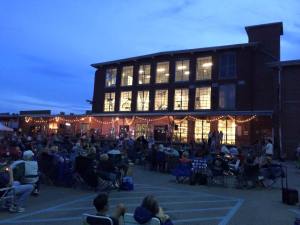 One of the nice things about where I live is that it is laid back. Traffic is light. Truck-sized parking is free and easy. If you go to a big concert downtown it’s a flat fee of $5 to park. You’re not having to do crazy things to get a ticket or a table or a seat or a place in line. Usually there isn’t a line. There are no rat runs on the way to school. And so we are not at each other’s throats.
One of the nice things about where I live is that it is laid back. Traffic is light. Truck-sized parking is free and easy. If you go to a big concert downtown it’s a flat fee of $5 to park. You’re not having to do crazy things to get a ticket or a table or a seat or a place in line. Usually there isn’t a line. There are no rat runs on the way to school. And so we are not at each other’s throats.
Until recently.
Lost & found
I was anti-GPS when they first started appearing on the dashboard of SUVs everywhere. I saw them as just another way to use technology to insulate us from the uncertainty of actual experience. Expat drivers who feared public transportation on suburban principle used them to navigate London. As someone who had had her share of frantically consulting an A-to-Z map at stoplights, you would think that I would have jumped at the chance to use one, but instead I saw them as a vote for ignorance. I don’t need to know where I am because the machine will tell me where to go. La la la.
There were stories in the news about drivers being commanded to traverse streams due to mapping errors. Using her new iPhone, my friend found herself down an alley in Baltimore while being told that she had arrived at the museum.
 But that was a few years ago. Technology improves and now there is the talking Google maps app, which I prefer over the Siri/Safari one, where it shows you and your route only. If you miss your turn, there you are as a blue dot traveling away from the blue line while your husband snaps at you. With the talking map, your husband won’t even know you have missed the turn because it adjusts and reroutes. It anticipates your questions and says things like, in 500 feet, slight right to stay on whatever road it is.
But that was a few years ago. Technology improves and now there is the talking Google maps app, which I prefer over the Siri/Safari one, where it shows you and your route only. If you miss your turn, there you are as a blue dot traveling away from the blue line while your husband snaps at you. With the talking map, your husband won’t even know you have missed the turn because it adjusts and reroutes. It anticipates your questions and says things like, in 500 feet, slight right to stay on whatever road it is.
It’s not perfect, but in general I like it. It is a good thing to use in Dothan, Alabama.
I am in Dothan for a tennis tournament. I don’t know my teammates very well and we don’t know our way around Dothan, a large town with a huge ring road. We have four key places we need to get to and go between and the talking map is a big help.
In 200 feet turn right.
 I become the map girl. We get into the car and I punch in whichever court we’re going to. Because we don’t know each other that well, they don’t know about my love of photographing old signs. I am shooting out of the car window, toggling between camera and map.
I become the map girl. We get into the car and I punch in whichever court we’re going to. Because we don’t know each other that well, they don’t know about my love of photographing old signs. I am shooting out of the car window, toggling between camera and map.
On our last day, I ask D. if we can stop on the way out so I can get a shot of the oyster bar/nightclub. The other car is following us. They stop, too. Now there are two cars of tennis ladies outside of a nightclub. A guy comes out to see what’s going on. Get the mural over there, too, someone says. It becomes kind of a team effort.
On our way home, it’s just D. and me. If there’s anything you want to stop for, just tell me, she says.
Leaving Dothan, I shoot the sign for the Hobo Pantry convenience store out of the window and am amazed to find out, further along the road to Montgomery, that it is some kind of chain because there is another one, another Hobo Pantry, what were they thinking??, between Ozark and Troy, when we stopped for gas. If you do a search for Hobo Pantry, you find surveillance camera stills and videos of robberies, mug shots, QR codes and Juggalos, but no corporate presence, no explanation of when, why and how this became the name for a business.
Furthermore, the guy working there, this enormous, heavyset black man, is in the midst of a transformation, his massive forearms hairless, his eyebrows redrawn and his voice low and melodious. What must it be like to be a transgender Hobo Pantry employee in Ozark, Alabama? One hopes he has a community that is larger and more diverse than what we would imagine he might find there. I ask D. if she noticed him and she did.
 She tells me about a girl she knows who, at 10, who despairs of the conservative views of her family and their town, which has a population of about 15,000 and is in a dry county. A church sign there bears the message “Dusty bibles lead to dirty lives.” This is the town I wrote about, where we collected our side of grass-fed beef from the deer processing place the first summer we lived here and each packet of beef came with a sticker that said “Smile, Jesus Loves You.” It has a main street you could fall in love with, like a movie set version of what a small town should look like.
She tells me about a girl she knows who, at 10, who despairs of the conservative views of her family and their town, which has a population of about 15,000 and is in a dry county. A church sign there bears the message “Dusty bibles lead to dirty lives.” This is the town I wrote about, where we collected our side of grass-fed beef from the deer processing place the first summer we lived here and each packet of beef came with a sticker that said “Smile, Jesus Loves You.” It has a main street you could fall in love with, like a movie set version of what a small town should look like.
The girl finds the disapproving attitudes of her family and peers about same-sex marriage stifling. She wants them to see things differently. I don’t know what D.’s views are, but she tells the girl to hang in there and that when she goes to away to college she will find lots of people who think as she does. The girl, she says, is just thinking about things at a different level and the world is a bigger place.
 We turn back for this amazing motel sign. As in Dothan, a man ambles out of the office, just to check. Do we look like troublemakers, still in our tennis clothes? I wave, get in car. Later, there is a big aluminum sign with holes riddled through it to read “Ye need to be born again.” A little ways on, we pass a large wooden water wheel, which I remark on. Oh, she says, somewhere along here there’s that sign about the devil. And as she says it, there’s a second water wheel, smaller, and a huge sign, which says “Go to church or the Devil will get you!” It makes dusty bibles sound euphemistic. This is the real deal: a devil with curling toes and his scythe out to harvest souls, never mind with the symbolism of housework. The water wheels suggest Blake’s satanic mills and also an unforgiving and relentless faith that fashions signs for motorists with the word Ye in them.
We turn back for this amazing motel sign. As in Dothan, a man ambles out of the office, just to check. Do we look like troublemakers, still in our tennis clothes? I wave, get in car. Later, there is a big aluminum sign with holes riddled through it to read “Ye need to be born again.” A little ways on, we pass a large wooden water wheel, which I remark on. Oh, she says, somewhere along here there’s that sign about the devil. And as she says it, there’s a second water wheel, smaller, and a huge sign, which says “Go to church or the Devil will get you!” It makes dusty bibles sound euphemistic. This is the real deal: a devil with curling toes and his scythe out to harvest souls, never mind with the symbolism of housework. The water wheels suggest Blake’s satanic mills and also an unforgiving and relentless faith that fashions signs for motorists with the word Ye in them.
Drive north for 800 miles.
Do you want to go back? But I figure enough people will have stopped already (and they have) and we will never get home, driving in loops.
The world is a bigger place, but are the small towns only for the conservative? People ask us about the move from London to Alabama, as if one is stuffing an inflatable pool dolphin into a matchbox. Why must the girl leave? Can’t a place expand in its own way? Maybe the transforming clerk is happy where he is. Isn’t it a matter of perspective?
In a quarter mile, exit right.
Your destination is all around you
Screenshot of the devil sign from this blog.
You’re a cab
Epiphanitis: what to know
 Ever since we moved to Huntsville, I have been curious about our public transportation, both by the blatant lack of it and its actual existence in the form of a bus network. Some of the buses are fitted with bike racks, suggesting a kind of Northern European progressiveness, when in fact walking or cycling as a mode of actual transport denotes economic catastrophe. Most buses advertise a local bail bondsmen.
Ever since we moved to Huntsville, I have been curious about our public transportation, both by the blatant lack of it and its actual existence in the form of a bus network. Some of the buses are fitted with bike racks, suggesting a kind of Northern European progressiveness, when in fact walking or cycling as a mode of actual transport denotes economic catastrophe. Most buses advertise a local bail bondsmen.
Our city’s transportation system is a shuttle bus that runs in a loop, a closed circuit, a journey of back of and forth with no promise of progress. You see the shuttle stop signs here and there, but seldom passengers waiting to board. There are not, generally, any bus shelters, no signs to indicate when a bus will come and where it might take you.
I find the maps on the city’s website and decide that I have some kind of moral duty as a citizen to ride one, just to know what it is like, where it goes, who rides, even though I have a pretty good idea, because I see the people who wait for it at the Bad Wal-Mart.
But what else compels me to ride? It is my epiphanitis, a disease invented by the Older Daughter as she studied English and science vocabulary in the weeks leading up to her midterms, turning each of the words into conditions.
If you were to read about what she’s got, playing with language would not be one of the attributes. Language would be listed as a deficit, as would sociability, whereas she is the most outgoing member of our family. Even our dog is an introvert.
I wait for the bus in one of the city’s few bus shelters, in the mall parking lot. The buses run on an hourly schedule. As soon as I sit down on the bench I join a community. People nod and wave to me, but discreetly, and the mall, on this overcast Monday, becomes more sociable than I have ever known it to be. Not everyone says hello, though, not the older people who come in workout clothes for walking laps in the atrium, but the workers do, the people who are in less of a hurry, including the lady who joins me on the bench, who will, fifteen minutes later, hold the passengers in the front of the bus rapt with her warnings that wireless fraudsters are stealing your credit card information right out of your pocket on this bus.
I had thought I was getting on a core loop bus but it is soon clear that my map had not indicated that there were other buses that stopped there. There are loops off of the main loop and this is one of those.
When I see the buses around town, they look empty but when I board, nearly every seat is taken. A man moves his bag off a seat so I can sit. The seats feel like they have been taken as parts out of other vehicles. They are tilted back too far so that either you have to slide down in them or sit up somewhat awkwardly.
The woman occupying three seats with duffel bags and a powerful smell and the pregnant, something-a-little-off girl get off at the hospital. More people get on. At the Nice Wal-Mart we pick up a gaunt man with long greying hair who I sometimes see walking along the roads and think of, therefore, as Walking Jesus. We pick up adults with disabilities. A woman and some too-young-for-school children. The ad racks inside the bus are empty, with only one poster, which is coming loose, with information about having a collapsed lung.
The bus takes us into modest developments with optimistic names, like Malibu. How strange it is to travel along these familiar roads as if I had dropped entirely out of my own life, where we meet inconvenience with a sarcastic, deadpan, “Really?” and into one of disenfranchised resignation and the obedient punctuality of those who know that what could be a 10-minute drive is an hour’s journey plus the time to get to the bus stop and go from it to wherever you’re going and repeat the whole thing to get back and whaddya gonna do about it. No one runs for the bus. People who ride the bus know the schedule.
A middle class looking retiree in a wind breaker gets on. At the Target mall, the bus pulls into the center of a section of parking lot, at the way opposite end of where the Target is, and waits for several minutes. A guy wearing a stonewashed jeans and jacket combo and Devo glasses gets on. Later, when my seatmate starts to tell me about a shooting on the number 4 bus and about all the enemies in the world and technology, but there’s only one true enemy and we know who that is, the man in the Devo glasses raises his eyebrows and gives me a half-smile.
1) You assume there will be more to it than that.
2) You turn to books.
When you, as a parent, first catch a whiff of a developmental issue you dive headfirst into the literature. If you can figure out what they have maybe someone will tell you how to fix it. You go to appointments and answer a lot of questions, you fill out hundreds of surveys. You keep thinking that at the end of all the questions there will be some answers, some light at the end of the tunnel, but there is always just the tunnel, the fattening file.
3) You find the answer in people.
After a while you start looking for different things: a program, a service, something for the next stage, a resource. Each experience yields something unexpected. Through the block of six sessions of language therapy we meet T., who told us about the school the older daughter would go to for seven years.
We lived two lives, one at the private international school, another at the state-run primary school. I went to parenting groups on housing estates and to Harley Street for speech therapy, sensory-integration therapy. Parents are parents. Kids are kids. Resources vary.
Over the years, I got good at locating programs. Once you have school placement figured out, you need activities. Summers are challenging. There will not be a program for your child, but maybe we can try it out. You will have to list their deficits on more forms and describe them as truthfully, hopefully, protectively as you can stand to. You leave out the humor and lyricism, though on a daily basis I can’t imagine what we would do without it. Epiphanitis is not an affliction, but a gift.
Now we are trying to find a summer camp. Ah, the application process for a kid with a disability. Does an attempt to be more honest mean that your child might miss out on something, losing her place to a child who has been more victorious in their battle to kick the ass of what would otherwise define her?
We’re not looking for answers, but for the right person.
4) You overthink it.
5) You weren’t expecting this.
Sometime before the Older Daughter was born I bought a big box of crayons because having them was like looking down the road to childhood. I didn’t know anything about the first couple of years. What’s a receiving blanket? Why do I need this or that? I didn’t know how far off crayons were, how many discussions I would have about pincer grip and shoulder stability and fine and gross motor skills. That what had come easily for me as a child would be a struggle for her. And anyway, I had found crayons frustrating, too. Once applied to paper their intense colors were thin and insubstantial and I gave them up for oil pastels and then watercolor markers. A fresh box of crayons is what childhood is supposed to be like and then how it isn’t.
6) You keep looking for answers.
You realize that epiphanitis by another name might be hope.
7) You live for epiphany.
Riding the bus here is like being the parent of a child who is different, or maybe being like a person who is different. The bus is a slower vehicle in a restricted path moving through its route, while the cars travel an easier, more efficient path. When the man tires of telling me about Satan he starts speaking to a man nearby, Haven’t seen you for while, been off the buses, getting rides with my brother.
You are in a community, you recognize each other, members of the tribe, the particular hurdles you share, like the way people were nodding hello at the bus shelter. Hard times, we know. There are more people on the bus than you would have thought. So you will always be on the bus, but the bus doesn’t have to be the way it is. The bus could better integrated into the city. The bus could be happier. The bus could be better understood by those who only notice it in passing and never stop to think, that could be me, or wonder what it’s like to not be them. Really? Yes, really.
Dressing for disaster
What do you wear from your capsule wardrobe as you prepare to maybe get stuck on the highway in a snowstorm?
The older daughter has a doctor’s appointment an hour and a half away.
I wear jeans, a black cardigan and grey sneakers. Easy. Just as well not to be distracted. I pack boots in case. The boots are not on the list of the 33 items I have pulled for the month’s fashion challenge, see previous post, but I am not getting frostbitten feet for the sake of “rules.”
Shopping is partly about the illusion of control. The week starts out with a survivalist determination, keeping the cars filled, the phones charged. I go buy most of the things that you should carry in your car. On the rare days when my windshield freezes over, I scrape it with whatever I can find, the unreturned hotel keycard, a squeegee, a hot tea towel. It’s time for an ice scraper and a brush. I buy a small bag of cat litter and a tow rope (that’s insane) and I pack sleeping bags.
I have driven this way many times but never alone or just with a child, never with instructions for clearing snow out of the tailpipe. There are a lot of trucks. We go by the sign for thegolfchurch.com and the most ancient Stuckey’s billboard with it’s sunfaded, blistered illustration of ice cream sundaes. Heavy raindrops splatter down at one point, but then stop. At Gardendale, the most truly enormous tallest cement cross hoves into sight and slips away.
We arrive. The weather is in abeyance. The hospital is designed to not feel like a hospital. The lobby has a cathedral ceiling with a sweep of glass and a curving reception desk.
Shopping for clothes is also about the illusion of control. The interview suit, the lucky boots, the perfect lipstick. Like shopping for milk and bread, or beer and dog food, however you imagine your disaster scenario. When I go to the supermarket the next day there has been a run on organic, free range eggs.
We shop to be prepared, to undertake an activity of preparation, scurrying about on the darkening roads, as if there were something we could do to stave off whatever is gathering in the clouds and signified by the rainbow filled shapes that pulse over the map with every weather report.
When the weather advisory lifts, will we be overwhelmed by choices?
Sitting in the consultation room we are without windows to watch the rain begin or hear the quickening rattle of sleet. We have made it this far. We’ll just have to see.
When we come out, the sky is grainy but dry. I drive and drive until at last the bridge over the Tennessee River rises up before us and we are on the final road home. And so there is no need for the sleeping bags, the boots, the tow rope, which have offered the illusion of protection, like the other half of my closet, packed with clothes for other seasons, other occasions. Each day is it’s own journey, what you wear, what you carry, what you leave behind. No one can ever accurately predict exactly what you will need, not even you.
Photo of the GFBC cross by Ben Tate via Panoramio, with permission.
Making tracks
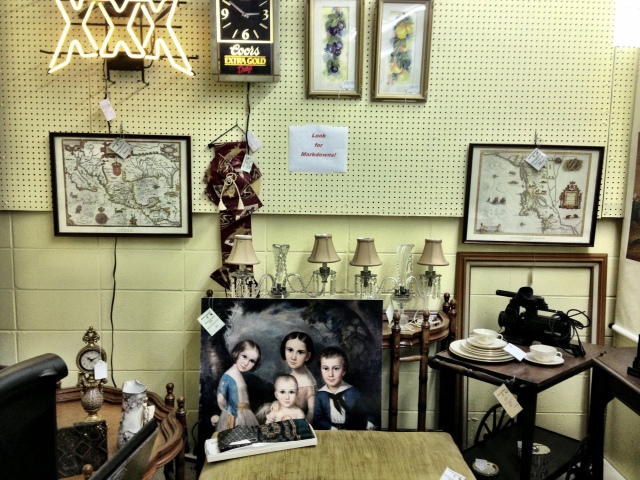 This is about journeys. This is about a hitchhiker, a walking man and a singer. This is about people’s stories and where their paths cross and what they carry.
This is about journeys. This is about a hitchhiker, a walking man and a singer. This is about people’s stories and where their paths cross and what they carry.
We’re in the car going to dinner, driving though the west side of town, where there are car dealerships, rock-bottom carpet, house of style and these apartment complexes where a person could disappear. There is a man all in black, walking purposefully. He has a design of flames around the hem of his shirt and shoulder-length, apricot-colored hair. He is wearing a short, black cape.
Look at the man, I say to my daughter, behind me.
Should we get him?, my husband asks. Because when you live in a place where no one walks pedestrians are like safari park animals, I guess. Because we are listening to the Ramones. We would never actually abduct a pedestrian, they belong in the wild, and I don’t know why he says it, but it’s funny, in a perverse way, which is why he said it.
The 13-year-old, ever practical, without missing a beat, says, “But, where would we put him?”
Other, better things happen as the result of our impulses. My husband gets the idea to invite a singer who does house concerts to come play at our house. She lives a couple of hours away and after a few emails back and forth a date is fixed and she will come play a concert. I suppose, for the 13-year-old, there is some slight connection between this and our absurdist car humor. You never know what these people will do next.
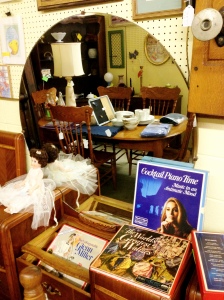 We clear all of the furniture from one end of the living room and line up seats and sofas. I love the emptiness of the room. The emptiness makes me happy. Emptiness feels like possibility. Knowing that there are many other things I could do, always, at any time, a fact that can be paralyzing, I decide that the couch being moved away from the wall gives me a chance to finish alphabetizing the fiction. This was something I had finally rallied to do a few weeks ago but every time I started I would get comments like if you’re going to do that, you could do this. Change the air filters, wash some dishes (I have spared you a post about the first-world trauma of a month of no dishwasher), but it’s been three years and, frankly, for my sanity if no one else’s, it needed to happen, and when it was done, though imperfectly, A-D is a bit jumbled, there was this incredible sense of order having been restored. I worked it so that Liebling and Mitchell share a shelf.
We clear all of the furniture from one end of the living room and line up seats and sofas. I love the emptiness of the room. The emptiness makes me happy. Emptiness feels like possibility. Knowing that there are many other things I could do, always, at any time, a fact that can be paralyzing, I decide that the couch being moved away from the wall gives me a chance to finish alphabetizing the fiction. This was something I had finally rallied to do a few weeks ago but every time I started I would get comments like if you’re going to do that, you could do this. Change the air filters, wash some dishes (I have spared you a post about the first-world trauma of a month of no dishwasher), but it’s been three years and, frankly, for my sanity if no one else’s, it needed to happen, and when it was done, though imperfectly, A-D is a bit jumbled, there was this incredible sense of order having been restored. I worked it so that Liebling and Mitchell share a shelf.
Tonight, my husband asked for Lanterns on the Levee, and I said, from upstairs, Middle section, second shelf from the bottom. But still, because he doesn’t hold with this kind of thing, I had to get it for him. However, I was able to pluck it from the shelf like a lady in a cereal commercial, sure of herself because she is in control, what with the jeans that button and the 99-calorie desk snacks and the 10 PM binges mastered by chocolate-tinged pulped fiber food product.
A friend who came to the concert told me afterwards that he told the singer about the time he hitchhiked from here to Seattle. I asked him to tell me about it. He ended up in some ghetto in Los Angeles and a gang of youth — I pictured something out of an 80s movie, one of those multiracial gangs they would have, with bandana headbands and sweatshirts with cut-off sleeves, but it could have been a couple of kids with backpacks on their way home from school — came up to him and asked if he had a knife. Now, this is a kind of basic thing I know from my urban youth, have mugger money in your pocket and if someone at all threatening asks for the time, don’t expose your watch.
Our friend pulls out his knife. He is telling a story on himself about naivete, but I am still surprised that he is carrying a knife. No, don’t take it out, I think. But he does. And here’s the funny part, the guy takes his knife, as you knew he would, but then he uses it to open a can of tuna fish. My friend says, Now, I don’t know how much you know about men and their knives [here I’m thinking, Clearly not much!] but we take pride in keeping them clean and sharp, and this L.A. guy, gangster or just a guy, had crossed a line. Somehow, our friend is whisked away, knife returned to him, by a cop who was like, What are you doing here? and tells him to get in the car and not to tell anyone, but he’s like, Of course it’s a story I tell everyone.
It took him five days to hitchhike across America and three to get across L.A. The trip, he says, restored his faith in people. It made him less cynical. The people who gave him rides are all sorts. There are kind and good people out there, even in L.A.
For the singer, he said, he thought that her travels had done something similar. You think of her pulling up at a house, following whatever directions had been sent to her, taking a risk with each one; and for him, the car or truck pulling to a stop. This is where your stories intersect. Once a person broke down at the exact place where he was hitchhiking.
At the concert, the singer tells stories about the songs, which are themselves stories, often about a time when it was sung and took on an additional layer of meaning, at Folsom Prison, or in Christchurch, New Zealand, just after the earthquake, or inside the Arctic Circle, where she saw the midnight sun and then a solar eclipse. She lays down tracks of story over story and if you imagine that each telling leaves a vapor trail you can look up into a blue sky and see a complex latticework of car rides and walking routes and maps and flight paths and songs and stories and experiences that we hand each other along the way, so that in this room full of our friends and their children, each of us will remember some piece of the experience as part of our own story.
After the singer has left and homework is done, I drive the girls down the parkway to a flea market. We listen to her CD in the car, already a soundtrack to our lives. At the antiques warehouse, we wander through stalls of untold stories, things and things to be priced, alphabetized, explained. Four impish children in a portrait stare and beckon us from beneath a neon beer sign.
We won’t hurt you, we won’t steal your watch, just tell us what you’re doing here. Tell us why you wear the cape.
A dog’s life
 When we finish up our work thing, we should drive out into the country to look for the Coon Dog Cemetery, I say, hopefully, to my friend. Alternatively, I say, because I have done a little research, we could go the Billy Reid store. There is a shoe sale on. Men’s shoes, really cute Oxfords, and these T-shirts for storm relief that say Alabama Forever.
When we finish up our work thing, we should drive out into the country to look for the Coon Dog Cemetery, I say, hopefully, to my friend. Alternatively, I say, because I have done a little research, we could go the Billy Reid store. There is a shoe sale on. Men’s shoes, really cute Oxfords, and these T-shirts for storm relief that say Alabama Forever.
One can also visit the WC Handy birthplace. Or visit the revolving restaurant with its river view. No one mentioned all the old signage. If you are headed to Florence, Alabama anytime soon I recommend you go shootin’.
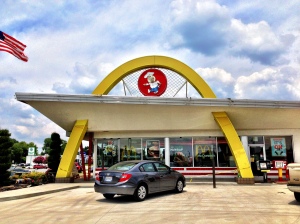 It is a goldmine out here. You see stores with names like Lock ‘n’ Load Ammo, but you would expect that in a place which has a burial ground for hunting dogs.
It is a goldmine out here. You see stores with names like Lock ‘n’ Load Ammo, but you would expect that in a place which has a burial ground for hunting dogs.
And dogs it is. She even pulls over in the parking lot of a McDonald’s on the way there, which has an original Golden Arch, saying, You must take a picture.
 Driving past the penitentiary, we see that next door to it is a Chuck E. Cheese’s, the grinning mouse springing up behind rolls of barbed wire. Oh, imagine the party mothers joking, Y’all behave…
Driving past the penitentiary, we see that next door to it is a Chuck E. Cheese’s, the grinning mouse springing up behind rolls of barbed wire. Oh, imagine the party mothers joking, Y’all behave…
 The directions indicate that the cemetery is only 15 minutes out of town but it is much further. It could be another 30 minutes. There is no turning back. We are driving down an empty road, cell coverage dropping in and out.
The directions indicate that the cemetery is only 15 minutes out of town but it is much further. It could be another 30 minutes. There is no turning back. We are driving down an empty road, cell coverage dropping in and out.
The blue GPS dot on my phone, indicates that we are sailing right past it in on a gravelly gray road with no markings, twisting its way further into the woods. What have I gotten us into?, I wonder briefly, but then there it is.
I sign the guest book. In case I am murdered, this will be my final proof of existence.
It is a graveyard in miniature, with tiny bouquets next to all the little headstones, some carved, some welded. One grave has a dog bowl next to it. There are collars, looped over wooden crosses. To be buried here one needs to be a certified coon hound and your friend needs to swear to it, too, but of the dog’s own merits to qualify I guess it’s just up to the owner as to whether they want to do it.
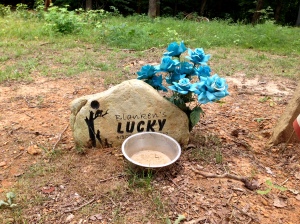 At our work retreat we had talked about what we wanted to do with our professional selves in the year ahead. We had read books in trios and shared things we found relevant. One group had us each write a one-sentence epitaph on the premise that in so doing you can identify your purpose and then make more of the days in between now and then.
At our work retreat we had talked about what we wanted to do with our professional selves in the year ahead. We had read books in trios and shared things we found relevant. One group had us each write a one-sentence epitaph on the premise that in so doing you can identify your purpose and then make more of the days in between now and then.
I photograph 26 graves and none of them were the ones that solely listed the credentials and awards of the deceased. But the dust in a bowl, the awkward wording, that’s the beauty of it.

Dogs live in the present and they don’t have stuff. They don’t dwell on things. They love a car trip. You see them skittering precariously in truck beds on highways all over the state, running in frantic little circles to bark over both sides at once, leaping onto the silver toolbox, barking at your dog, your dog barking back.
 And to lose them is inevitable. You get about decade, most of a childhood. Here is this place where they are carved barking up trees and remembered in an elegy that involves a raccoon trapped in a mailbox.
And to lose them is inevitable. You get about decade, most of a childhood. Here is this place where they are carved barking up trees and remembered in an elegy that involves a raccoon trapped in a mailbox.
There need to be places like this in the world, that are universal and specific; that are detours and destinations; where a friend humors you and your husband holds down the fort for a few extra hours. The days fly by in a blur of doing, trying to reach a state where nothing is broken, no one is sick, all appointments have been made, everything is taken care of and dinner will happen as if by magic.
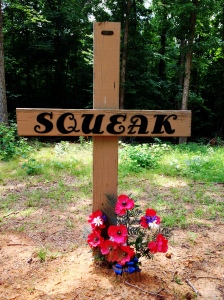 Be like the dog who is just happy to see you when you get home and makes you stop and say hello and be, like they say in the books you have raced to get through this summer, fully present.
Be like the dog who is just happy to see you when you get home and makes you stop and say hello and be, like they say in the books you have raced to get through this summer, fully present.
